19 june 2015

Member of Hamas political bureau Mousa Abu Marzouk said no written proposal was brought to discussion with Palestinian factions in regards to a truce with Israel. He noted that what have been discussed were verbal proposals set forth by foreign diplomats.
In a statement on his Facebook page, Abu Marzouk disclosed that the United Nations Special Coordinator for the Middle East Peace Process Robert Serry, Tony Blair and other political diplomats verbally talked about the truce with Hamas.
Hamas senior official Abu Marzouk said that the Palestinian Authority’s (PA) outrage on the matter is unjustified, confirming that Hamas will not change its political standings and commitment to the Palestinian People’s rights and constants.
He stressed that his movement will not take solo decisions or bargain on Palestinians' rights in Gaza and the West Bank especially ending the siege on Gaza, Gaza reconstruction, reopening of the airport, and construction of Gaza Harbor.
In a statement on his Facebook page, Abu Marzouk disclosed that the United Nations Special Coordinator for the Middle East Peace Process Robert Serry, Tony Blair and other political diplomats verbally talked about the truce with Hamas.
Hamas senior official Abu Marzouk said that the Palestinian Authority’s (PA) outrage on the matter is unjustified, confirming that Hamas will not change its political standings and commitment to the Palestinian People’s rights and constants.
He stressed that his movement will not take solo decisions or bargain on Palestinians' rights in Gaza and the West Bank especially ending the siege on Gaza, Gaza reconstruction, reopening of the airport, and construction of Gaza Harbor.
18 june 2015

Israeli Occupation Forces (IOF) advanced a limited distance in Palestinian lands to the east of Gaza City on Thursday.
Local sources told Quds Press that several Israeli military vehicles and bulldozers advanced into lands to the eastern outskirts of the city in al-Shujaiyah district.
The Israeli forces opened machinegun fire at random and leveled lands during the incursion. No casualties have been reported.
The attack is another episode in the series of Israeli daily violations of the Cairo-brokered truce accord signed in the wake of last summer’s offensive on the besieged coastal enclave, which killed over 2,300 Palestinians, mostly civilians.
Local sources told Quds Press that several Israeli military vehicles and bulldozers advanced into lands to the eastern outskirts of the city in al-Shujaiyah district.
The Israeli forces opened machinegun fire at random and leveled lands during the incursion. No casualties have been reported.
The attack is another episode in the series of Israeli daily violations of the Cairo-brokered truce accord signed in the wake of last summer’s offensive on the besieged coastal enclave, which killed over 2,300 Palestinians, mostly civilians.
17 june 2015
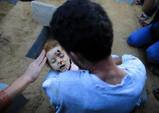
Almost a year on from the beginning of Israel's 'Operation Protective Edge' and the ceasefire that ended hostilities has largely held, albeit with dozens of Israeli attacks on Gaza civilians, the continued blockade, and some half a dozen rocket launches. While the Israeli army and Palestinian factions prepare themselves in the event of a new confrontation, recent developments suggest that Gaza stands between the deterioration of a tense stand-off and a more substantial truce.
After August's ceasefire, Israel's attacks on the Gaza Strip never actually stopped, but instead returned to a grimly familiar level of routine shootings and incursions. By April, according to a coalition of more than 40 international aid agencies, there had been "more than 400 incidents of Israeli fire into Gaza" over the previous seven months.
From January 1 to March 31, 2015, Israeli forces killed 1 Palestinian, wounded 16, and conducted 6 land incursions and at least 67 shooting attacks in Gaza, during a period of zero rocket fire. It is similar to the state of affairs after 'Operation Pillar of Defense'; from November 22, 2012 to February 22, 2013, Israeli forces killed 4 Palestinians and wounded 91 in Gaza, in daily attacks.
Thus once again, Israel has followed up a Gaza ceasefire agreement with almost daily violence targeting fishermen, farmers, protesters, and others. Of course, the same level of fire from Gaza into Israel would already have prompted another war; but few commentators have rushed to note the 'restraint' of Hamas and other Palestinian groups.
In addition to its actions in Gaza's territorial waters and inside the border fence, the Israeli military is busy preparing for a future offensive. These preparations include spending millions of shekels on special training facilities for tunnel warfare, new "urban warfare training", and building a 50 square meter, three-dimensional model of the Gaza Strip to help "prepare for operations".
Some Israeli communities close to the Gaza border fence "continue to host IDF units", as well as boasting "trained civilian armed response teams." In April, Israeli media reported that the army is "training for the possible reconquering of the entire [Gaza Strip]" in another round of fighting described as "only a matter of time."
Earlier this month, the Israeli army held a military exercise close to the Gaza Strip which it described as a "pre-planned part of yearly training exercises" intended to "maintain military preparedness." In May, meanwhile, the US government cleared a $1.9 billion package for the Israeli military to resupply its air force with precision-guided munitions.
Palestinian factions have also been readying themselves for renewed hostilities. In March, al-Qassam Brigades (AQB) said it had rebuilt a number of its military bases and training facilities near the Gaza border fence. "No sooner has the war come to an end, than the AQB started a new stage of the conflict in preparation for the battle of liberation", the statement read.
The rebuilding of the tunnel infrastructure is also reportedly underway, as is the manufacture of home-made rockets, to replace those fired or destroyed last year. It's not just Hamas either. The Popular Resistance Committee's al-Nasser Salah al-Din Brigades for example, the third largest armed faction in Gaza, has also shared its preparations for renewed fighting.
Since the August ceasefire, AQB has not fired a single rocket into Israel. According to Haaretz security correspondent Amos Harel, by May 30, 2015, rockets had been fired just six times from Gaza in 10 months, "all of them into open areas." On June 3, and again on June 6, there were two more launches. Those last two incidents, causing neither damage nor injuries, were attributed to individuals claiming affiliation with Islamic State. Just "minutes" after the rocket fire on June 3, "Hamas sent a message to Israel via Egypt that responsibility for the attack lay with a Salafist group."
Israel has responded to the sporadic rocket attacks of the last month with airstrikes on AQB-linked sites across the Gaza Strip. No matter which group actually carries out an attack, Hamas is held responsible. However, according to Israeli analysts, there is a discrepancy between on the one hand, tough "public declarations by Israel's government", and, on the other hand, Israeli actions such as "punitive attacks on Hamas [that] do not harm anyone."
This approach was described in The Times of Israel by Avi Issacharoff as "embrace and contain, rather than pursue direct military confrontation." Israeli journalist Ben Caspit went further, claiming that the Israeli army "is in favour of negotiations" with Hamas leading to "understandings."
Issacharoff noted that Israel has allowed Qatar a "foothold" in Gaza through its representative Mohammed Al-Emadi, while also approving a visit by Turkey's religious affairs minister. On June 10, Yesh Atid MK Haim Jelin complained of "negotiations between Hamas and Israel under our noses, via foreign embassies." Responding, Deputy Defense Minister Eli Ben-Dahan reportedly said that Hamas, "as the only effective body in Gaza", does not want an escalation.
On June 8, Ya'alon defended a policy he described as "determined and decisive", yet "also one that is measured and responsible." He also vowed to "act with similar force [to 'Operation Protective Edge'] in the future", should Israel be "required to." In the context, this June 3 photograph of Hamas forces watching Israeli bulldozers working on the border fence symbolises the uneasy status quo; there are rules to be observed, beyond the rhetoric.
Hamas, meanwhile, faces its own challenges. While AQB has held its fire for ten months, the Israeli strategy of strikes in response to Salafist rocket fire carries risks; what would happen, for example, if there were - even unintentional - casualties? An official statement on May 27, following Israeli airstrikes, said that Hamas "holds Israel fully responsible for the escalation and warns that it should not continue with this folly."
The organisation will have taken heart from evidence of its continued popularity in a recent poll, where 39% of Palestinians in Gaza said they would vote for Hamas in parliamentary elections, up from 32% a year ago. In the West Bank too, support for Hamas had risen. However, 63% of Palestinians in the West Bank and Gaza Strip expressed dissatisfaction with the achievements of last year's war, compared to the losses incurred.
According to Dr Saleh al-Na'ami, a Gaza-based journalist and university lecturer, neither party is interested in renewing hostilities. Hamas, for its part, "recognises that people are not ready" for a new war, while Israel knows that "it achieved nothing" with last year's offensive. Dr. al-Na'ami cautioned, however, that should Gaza's residents "feel there is no hope for the reconstruction or end of the siege", then "they might prefer to go for a war that might bring a kind of change."
While many in the Israeli media have discussed an apparent 'split' between Hamas' political leadership and AQB over short-term strategic decisions and regional relations, analysts in Gaza play this down. Dr. Adnan Abu-Amer, a lecturer and commentator based at Gaza's Al-Ummah University, points out that the difference of opinions is "normal", because "any decision is decided democratically" and all levels of the group "commit to the final decision whatever it is."
In the past week, stories have appeared concerning a possible truce deal being mediated indirectly by various parties – including a meeting between Tony Blair and Khalid Mish'al, where the former is reported to have discussed proposals for a longer-term calm in Gaza. Meanwhile, Hamas official Mousa Abu Marzouq this week headed to Doha for talks with Mish'al that are said to include the potential for a long-term ceasefire agreement.
Hamas official Salah Bardawil, however, has denied any "contacts for a long-term period of calm under the auspices of any country", stating that the group has no intention of coming to an arrangement separate from the agreement that ended hostilities last August. The remarks are likely directed at concerns about regionally or internationally-mediated understandings between Israel and Hamas turning Gaza into its own "mini-state."
In parallel with these developments, there are also signs of small-scale efforts to defuse some of the hostility between the Egyptian regime and Hamas, with the latter's officials holding a meeting with Egyptian intelligence chief Khalid Fawzi based on Qatari mediation in Doha. Hamas foreign relations chief Osama Hamdan, speaking to Aqsa TV on June 8, welcomed the decision of an Egyptian court to remove Hamas from a list of terrorist organisations.
Thus the summer begins with a kind of stalemate. For its part, Israel knows that a repeat of last year's attack would be costly; both in terms of international legitimacy, and the lives of its own citizens. Invading the Gaza Strip, and retaining ground forces in an open-ended, renewed form of military rule would be even worse, on both counts.
Hamas, meanwhile, seeks a breakthrough for Gaza's residents, and looks to relieve the pressure on the organisation. Thus Israel will probably tolerate isolated rocket attacks in open areas, while Hamas will remain "interested in calm" and continue its crackdown on the Salafists.
There are other factors too, such as a possible prisoner exchange, and the lack of a solution to Palestinian political division. But a more fundamental breakthrough is difficult to foresee; one Israeli defense official told Haaretz this week: "Why do we need to agree to a port or airport, or to other such decisions in return for quiet, as long as the quiet is being preserved by Israeli deterrence?"
This is a risky strategy. A blockaded Gaza Strip, lying in ruins and with rampant unemployment, is no recipe for 'calm'. Furthermore, a rapid deterioration is also possible; the roots of last year's war were at least partly in the West Bank, through events no one could have predicted. So Gaza is stuck between war and peace, battered and fenced-in, with no end in sight for the suffering of its population.
After August's ceasefire, Israel's attacks on the Gaza Strip never actually stopped, but instead returned to a grimly familiar level of routine shootings and incursions. By April, according to a coalition of more than 40 international aid agencies, there had been "more than 400 incidents of Israeli fire into Gaza" over the previous seven months.
From January 1 to March 31, 2015, Israeli forces killed 1 Palestinian, wounded 16, and conducted 6 land incursions and at least 67 shooting attacks in Gaza, during a period of zero rocket fire. It is similar to the state of affairs after 'Operation Pillar of Defense'; from November 22, 2012 to February 22, 2013, Israeli forces killed 4 Palestinians and wounded 91 in Gaza, in daily attacks.
Thus once again, Israel has followed up a Gaza ceasefire agreement with almost daily violence targeting fishermen, farmers, protesters, and others. Of course, the same level of fire from Gaza into Israel would already have prompted another war; but few commentators have rushed to note the 'restraint' of Hamas and other Palestinian groups.
In addition to its actions in Gaza's territorial waters and inside the border fence, the Israeli military is busy preparing for a future offensive. These preparations include spending millions of shekels on special training facilities for tunnel warfare, new "urban warfare training", and building a 50 square meter, three-dimensional model of the Gaza Strip to help "prepare for operations".
Some Israeli communities close to the Gaza border fence "continue to host IDF units", as well as boasting "trained civilian armed response teams." In April, Israeli media reported that the army is "training for the possible reconquering of the entire [Gaza Strip]" in another round of fighting described as "only a matter of time."
Earlier this month, the Israeli army held a military exercise close to the Gaza Strip which it described as a "pre-planned part of yearly training exercises" intended to "maintain military preparedness." In May, meanwhile, the US government cleared a $1.9 billion package for the Israeli military to resupply its air force with precision-guided munitions.
Palestinian factions have also been readying themselves for renewed hostilities. In March, al-Qassam Brigades (AQB) said it had rebuilt a number of its military bases and training facilities near the Gaza border fence. "No sooner has the war come to an end, than the AQB started a new stage of the conflict in preparation for the battle of liberation", the statement read.
The rebuilding of the tunnel infrastructure is also reportedly underway, as is the manufacture of home-made rockets, to replace those fired or destroyed last year. It's not just Hamas either. The Popular Resistance Committee's al-Nasser Salah al-Din Brigades for example, the third largest armed faction in Gaza, has also shared its preparations for renewed fighting.
Since the August ceasefire, AQB has not fired a single rocket into Israel. According to Haaretz security correspondent Amos Harel, by May 30, 2015, rockets had been fired just six times from Gaza in 10 months, "all of them into open areas." On June 3, and again on June 6, there were two more launches. Those last two incidents, causing neither damage nor injuries, were attributed to individuals claiming affiliation with Islamic State. Just "minutes" after the rocket fire on June 3, "Hamas sent a message to Israel via Egypt that responsibility for the attack lay with a Salafist group."
Israel has responded to the sporadic rocket attacks of the last month with airstrikes on AQB-linked sites across the Gaza Strip. No matter which group actually carries out an attack, Hamas is held responsible. However, according to Israeli analysts, there is a discrepancy between on the one hand, tough "public declarations by Israel's government", and, on the other hand, Israeli actions such as "punitive attacks on Hamas [that] do not harm anyone."
This approach was described in The Times of Israel by Avi Issacharoff as "embrace and contain, rather than pursue direct military confrontation." Israeli journalist Ben Caspit went further, claiming that the Israeli army "is in favour of negotiations" with Hamas leading to "understandings."
Issacharoff noted that Israel has allowed Qatar a "foothold" in Gaza through its representative Mohammed Al-Emadi, while also approving a visit by Turkey's religious affairs minister. On June 10, Yesh Atid MK Haim Jelin complained of "negotiations between Hamas and Israel under our noses, via foreign embassies." Responding, Deputy Defense Minister Eli Ben-Dahan reportedly said that Hamas, "as the only effective body in Gaza", does not want an escalation.
On June 8, Ya'alon defended a policy he described as "determined and decisive", yet "also one that is measured and responsible." He also vowed to "act with similar force [to 'Operation Protective Edge'] in the future", should Israel be "required to." In the context, this June 3 photograph of Hamas forces watching Israeli bulldozers working on the border fence symbolises the uneasy status quo; there are rules to be observed, beyond the rhetoric.
Hamas, meanwhile, faces its own challenges. While AQB has held its fire for ten months, the Israeli strategy of strikes in response to Salafist rocket fire carries risks; what would happen, for example, if there were - even unintentional - casualties? An official statement on May 27, following Israeli airstrikes, said that Hamas "holds Israel fully responsible for the escalation and warns that it should not continue with this folly."
The organisation will have taken heart from evidence of its continued popularity in a recent poll, where 39% of Palestinians in Gaza said they would vote for Hamas in parliamentary elections, up from 32% a year ago. In the West Bank too, support for Hamas had risen. However, 63% of Palestinians in the West Bank and Gaza Strip expressed dissatisfaction with the achievements of last year's war, compared to the losses incurred.
According to Dr Saleh al-Na'ami, a Gaza-based journalist and university lecturer, neither party is interested in renewing hostilities. Hamas, for its part, "recognises that people are not ready" for a new war, while Israel knows that "it achieved nothing" with last year's offensive. Dr. al-Na'ami cautioned, however, that should Gaza's residents "feel there is no hope for the reconstruction or end of the siege", then "they might prefer to go for a war that might bring a kind of change."
While many in the Israeli media have discussed an apparent 'split' between Hamas' political leadership and AQB over short-term strategic decisions and regional relations, analysts in Gaza play this down. Dr. Adnan Abu-Amer, a lecturer and commentator based at Gaza's Al-Ummah University, points out that the difference of opinions is "normal", because "any decision is decided democratically" and all levels of the group "commit to the final decision whatever it is."
In the past week, stories have appeared concerning a possible truce deal being mediated indirectly by various parties – including a meeting between Tony Blair and Khalid Mish'al, where the former is reported to have discussed proposals for a longer-term calm in Gaza. Meanwhile, Hamas official Mousa Abu Marzouq this week headed to Doha for talks with Mish'al that are said to include the potential for a long-term ceasefire agreement.
Hamas official Salah Bardawil, however, has denied any "contacts for a long-term period of calm under the auspices of any country", stating that the group has no intention of coming to an arrangement separate from the agreement that ended hostilities last August. The remarks are likely directed at concerns about regionally or internationally-mediated understandings between Israel and Hamas turning Gaza into its own "mini-state."
In parallel with these developments, there are also signs of small-scale efforts to defuse some of the hostility between the Egyptian regime and Hamas, with the latter's officials holding a meeting with Egyptian intelligence chief Khalid Fawzi based on Qatari mediation in Doha. Hamas foreign relations chief Osama Hamdan, speaking to Aqsa TV on June 8, welcomed the decision of an Egyptian court to remove Hamas from a list of terrorist organisations.
Thus the summer begins with a kind of stalemate. For its part, Israel knows that a repeat of last year's attack would be costly; both in terms of international legitimacy, and the lives of its own citizens. Invading the Gaza Strip, and retaining ground forces in an open-ended, renewed form of military rule would be even worse, on both counts.
Hamas, meanwhile, seeks a breakthrough for Gaza's residents, and looks to relieve the pressure on the organisation. Thus Israel will probably tolerate isolated rocket attacks in open areas, while Hamas will remain "interested in calm" and continue its crackdown on the Salafists.
There are other factors too, such as a possible prisoner exchange, and the lack of a solution to Palestinian political division. But a more fundamental breakthrough is difficult to foresee; one Israeli defense official told Haaretz this week: "Why do we need to agree to a port or airport, or to other such decisions in return for quiet, as long as the quiet is being preserved by Israeli deterrence?"
This is a risky strategy. A blockaded Gaza Strip, lying in ruins and with rampant unemployment, is no recipe for 'calm'. Furthermore, a rapid deterioration is also possible; the roots of last year's war were at least partly in the West Bank, through events no one could have predicted. So Gaza is stuck between war and peace, battered and fenced-in, with no end in sight for the suffering of its population.

Prominent Hamas leader Khalil Al-Hayya described the reports about a new truce between his movement and the Israeli occupation as an attempt to "distract" the public and "alluding" that Gaza's problems can be solved with a truce, Felesteen newspaper said yesterday.
On Twitter he explained that those who speak about a new truce have ignored the ceasefire deal reached between the Palestinian factions and the Israeli occupation last August.
The Egyptian-sponsored deal includes lifting the eight-year Israeli siege on Gaza and rebuilding the houses and other facilities destroyed by the occupation during the 51-day Israeli offensive.
"Our demand is the commitment of the Israeli occupation to the obligations in the deal," he said, "the main obligation is opening the Rafah crossing and allowing the entrance of rebuilding material."
On Twitter he explained that those who speak about a new truce have ignored the ceasefire deal reached between the Palestinian factions and the Israeli occupation last August.
The Egyptian-sponsored deal includes lifting the eight-year Israeli siege on Gaza and rebuilding the houses and other facilities destroyed by the occupation during the 51-day Israeli offensive.
"Our demand is the commitment of the Israeli occupation to the obligations in the deal," he said, "the main obligation is opening the Rafah crossing and allowing the entrance of rebuilding material."

Talks about a ceasefire deal to be struck between Hamas and the Israeli occupation authority aim at pulling the wool over the public’s eyes, political bureau member of Hamas Khalil al-Hayya said afternoon Tuesday.
Al-Hayya said, in official tweets of his, the propagated rumors are oblivious to the Egyptian-brokered truce accord signed in the wake of last summer’s Israeli offensive on the blockaded Gaza Strip and stipulating that the IOA would lift the siege and allow reconstruction. "But none of such bonds has seen the day".
Al-Hayya advised the IOA to cease violations of the truce deal and put into effect all of its bonds, including the unconditional opening of border crossings and the free entrance of rebuilding materials into the Strip.
A military aggression launched by Israel on July 7 took away the lives of 2,300 Palestinians, mostly children and women, and left thousands of others wounded.
A ceasefire deal signed at the rear of the 51-day offensive has frequently been infringed by the Israeli occupation forces.
Hamas: Extension of Truce with Israel Possible
Hamas officials are expecting that it will soon be possible to extend the temporary truce with Israel to a period of 5 years, according to a proposal laid out by Qatar which includes an easing of the Israeli siege on Gaza and the establishment of a floating seaport off the coast.
Hamas leader Khalil al-Haya said: “Talks on a truce depend on the public opinion.”
Local news sources had said, according to the PNN, that Hamas’ proposal presented an offer of a truce with Israel in return for a seaport and an airport, and peace extending at least 5 years via Western diplomatic mediation.
UN Envoy to the Middle East, Robert Serry visited Swiss Consul Paul Greening in the Gaza Strip more than once, and the two officials met with a number of Hamas leaders such as Vice President of the Political Office Mousa Abu Marzouq, Basem Na’im and Ghazi Hamed.
Israeli media sources quoted what they called ‘documents’ as confirming that Hamas’ offer proposes a truce lasting between 3 and 5 years based on Western diplomatic mediation.
Hebrew news site Walla said that the ‘communiques and documents from Hamas concerning the truce proposal were delivered to Israel by Western diplomats’.
The news site added that Hamas was based in the Gaza Strip and ‘living in conditions more difficult than ever’.
Walla indicated that Hamas had also proposed a truce lasting up to 15 years, but had rescinded this proposal and instead reached out to Western diplomats for their approval on a 5 year truce. The truce includes the halting of all military operations above and below ground in return for an Israeli commitment to respecting the ceasefire, as well as an easing of the siege on Gaza, allowing the import and export of goods, the establishment of a sea port and the rehabilitation of the Yasser Arafat International Airport located between Rafah and Dahaniya close to the Egyptian border.
According to the Israeli news site, Middle East Quartet Envoy Tony Blair presented a document in English to Hamas, via the Working Men Group in Gaza, which guarantees the establishment of a Palestinian state along the 1967 borders with Jerusalem as its capital and the right of return.
Al-Hayya said, in official tweets of his, the propagated rumors are oblivious to the Egyptian-brokered truce accord signed in the wake of last summer’s Israeli offensive on the blockaded Gaza Strip and stipulating that the IOA would lift the siege and allow reconstruction. "But none of such bonds has seen the day".
Al-Hayya advised the IOA to cease violations of the truce deal and put into effect all of its bonds, including the unconditional opening of border crossings and the free entrance of rebuilding materials into the Strip.
A military aggression launched by Israel on July 7 took away the lives of 2,300 Palestinians, mostly children and women, and left thousands of others wounded.
A ceasefire deal signed at the rear of the 51-day offensive has frequently been infringed by the Israeli occupation forces.
Hamas: Extension of Truce with Israel Possible
Hamas officials are expecting that it will soon be possible to extend the temporary truce with Israel to a period of 5 years, according to a proposal laid out by Qatar which includes an easing of the Israeli siege on Gaza and the establishment of a floating seaport off the coast.
Hamas leader Khalil al-Haya said: “Talks on a truce depend on the public opinion.”
Local news sources had said, according to the PNN, that Hamas’ proposal presented an offer of a truce with Israel in return for a seaport and an airport, and peace extending at least 5 years via Western diplomatic mediation.
UN Envoy to the Middle East, Robert Serry visited Swiss Consul Paul Greening in the Gaza Strip more than once, and the two officials met with a number of Hamas leaders such as Vice President of the Political Office Mousa Abu Marzouq, Basem Na’im and Ghazi Hamed.
Israeli media sources quoted what they called ‘documents’ as confirming that Hamas’ offer proposes a truce lasting between 3 and 5 years based on Western diplomatic mediation.
Hebrew news site Walla said that the ‘communiques and documents from Hamas concerning the truce proposal were delivered to Israel by Western diplomats’.
The news site added that Hamas was based in the Gaza Strip and ‘living in conditions more difficult than ever’.
Walla indicated that Hamas had also proposed a truce lasting up to 15 years, but had rescinded this proposal and instead reached out to Western diplomats for their approval on a 5 year truce. The truce includes the halting of all military operations above and below ground in return for an Israeli commitment to respecting the ceasefire, as well as an easing of the siege on Gaza, allowing the import and export of goods, the establishment of a sea port and the rehabilitation of the Yasser Arafat International Airport located between Rafah and Dahaniya close to the Egyptian border.
According to the Israeli news site, Middle East Quartet Envoy Tony Blair presented a document in English to Hamas, via the Working Men Group in Gaza, which guarantees the establishment of a Palestinian state along the 1967 borders with Jerusalem as its capital and the right of return.
16 june 2015
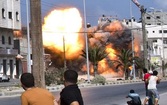
By Khalid Amayreh in the West Bank
A report issued Sunday by the Israeli occupation army on last year's genocidal blitz in the Gaza Strip claimed that Israeli forces didn't intentionally target Palestinian civilians.
The report, issued belatedly and scandalously fraught with half-truths, selective data taken out of context and containing a preponderance of sheer lies, seems to be intended to counter growing international convictions that Israel did commit real war crimes and crimes against humanity during its 50-day devastating aggression on Gaza last summer.
However, it seems that Israel’s task of exonerating itself of manifestly damning charges related to war crimes is not going to be easy.
Indeed, the irrefutable facts available to the UN, the Red Cross and other neutral third parties should be sufficient to condemn and convict Israel as a murderous state.
There are also thousands of testimonies by on-the-ground eyewitness who have presented credible and honest narratives of the atrocities which killed and maimed thousands of civilians including hundreds of children.
It is really hard to believe that thousands of civilians were killed inadvertently or by mistake or as a result of collateral damage. Believing such claims would be an insult to human intelligence.
True, Israel is constantly shielded from international condemnation, especially punishment, by the United States, Israel's ultimate guardian-ally, as well as the governments of Western Europe.
But in this age of open skies and internet, it is imperative for all honest men and women around the world, irrespective of their religion or race, to expose the brutal ugliness of this criminal entity called Israel. This is the very least humanity should do on behalf of the helpless victims.
This is very crucial because Israel is convinced it is above the laws of man and God and unbounded by the international norms.
And should the world, God forbid, continue to fail to call the spade a spade, especially when the proverbial implement is seen in the hands of our grave-diggers, and I am not speaking metaphorically, it should be a foregone conclusion that Israel could or probably would eventually embark on the unthinkable vis-à-vis its helpless victims.
I don't know for sure how the unthinkable would be played out on the ground. However, 67 years of the Israeli experience should be more than sufficient to invoke and remember Stalin and his Gulags, Hitler and his concentration camps, Pol Pot and his genocidal crimes and Bashar El-Assad and his sectarian massacres.
Don’t tell me Israel is too civilized and wouldn't indulge in the unthinkable. The truth is that Israel would unhesitatingly embark on the unthinkable should the humanity go into a brief moment of slumber.
Israel calculates that apart from a brief outburst of half-hearted denunciations and some vociferous demonstrations in some western capitals, the world powers, particularly the US, would just "let it pass" and probably content with issuing indifferent calls on "all sides to exercise self-restraint."
I really don't know if the macabre Israeli calculations are accurate or not. However, from our bitter experience with the West especially since the Second World War, Israel seems ostensibly correct in its prognosis of western moral bankruptcy.
Indeed, a West that is looking on rather passively as Assad with active support from the Russians, the Iranians and Hizbullah is slaughtering hundreds of thousands of Syrian civilians, is decidedly unlikely to experience an awakening of moral conscience if and when the Israeli death machine gangs up on the Palestinians.
Genocidal Israelis
Israel is not Denmark or Sweden or even Britain. There is a definitely genocidal mindset in Israel which millions of Europeans and North Americans cannot easily detect due to many years of sustained brain-washing by Zionist-influenced or Zionist controlled media in the West.
Several years ago, an Israeli settler leader named Daniela Weiss from a colony in the northern West Bank delivered a hair-raising speech to dozens of fanatical Gush Emunim settlers in Hebron.
In her brief tirade, the gung ho settler leader told the fanatical multitude that the best way to deal with the Palestinians was the Joshua's way, an allusion to Biblical massacres carried out by Biblical Israelites against indigenous Canaanite tribes.
The speech, met with loud cheers, didn't raise many eyebrows in Israel, neither in the media nor in the government.
Hence, the claim that Israelis or Jews wouldn't allow the government of Israel to resort to genocide against the Palestinian is based more on wishful thinking than on any convincing arguments.
Today, the Palestinian people owe their survival as a people to the good-will of the international community.
But the continuity of this good-will cannot be taken for granted. This is why humanity must remain vigilant because the Israeli snake is venomous and treacherous.
Khalid Amayreh is a veteran Palestinian journalist and current affairs commentators living in occupied Palestine
A report issued Sunday by the Israeli occupation army on last year's genocidal blitz in the Gaza Strip claimed that Israeli forces didn't intentionally target Palestinian civilians.
The report, issued belatedly and scandalously fraught with half-truths, selective data taken out of context and containing a preponderance of sheer lies, seems to be intended to counter growing international convictions that Israel did commit real war crimes and crimes against humanity during its 50-day devastating aggression on Gaza last summer.
However, it seems that Israel’s task of exonerating itself of manifestly damning charges related to war crimes is not going to be easy.
Indeed, the irrefutable facts available to the UN, the Red Cross and other neutral third parties should be sufficient to condemn and convict Israel as a murderous state.
There are also thousands of testimonies by on-the-ground eyewitness who have presented credible and honest narratives of the atrocities which killed and maimed thousands of civilians including hundreds of children.
It is really hard to believe that thousands of civilians were killed inadvertently or by mistake or as a result of collateral damage. Believing such claims would be an insult to human intelligence.
True, Israel is constantly shielded from international condemnation, especially punishment, by the United States, Israel's ultimate guardian-ally, as well as the governments of Western Europe.
But in this age of open skies and internet, it is imperative for all honest men and women around the world, irrespective of their religion or race, to expose the brutal ugliness of this criminal entity called Israel. This is the very least humanity should do on behalf of the helpless victims.
This is very crucial because Israel is convinced it is above the laws of man and God and unbounded by the international norms.
And should the world, God forbid, continue to fail to call the spade a spade, especially when the proverbial implement is seen in the hands of our grave-diggers, and I am not speaking metaphorically, it should be a foregone conclusion that Israel could or probably would eventually embark on the unthinkable vis-à-vis its helpless victims.
I don't know for sure how the unthinkable would be played out on the ground. However, 67 years of the Israeli experience should be more than sufficient to invoke and remember Stalin and his Gulags, Hitler and his concentration camps, Pol Pot and his genocidal crimes and Bashar El-Assad and his sectarian massacres.
Don’t tell me Israel is too civilized and wouldn't indulge in the unthinkable. The truth is that Israel would unhesitatingly embark on the unthinkable should the humanity go into a brief moment of slumber.
Israel calculates that apart from a brief outburst of half-hearted denunciations and some vociferous demonstrations in some western capitals, the world powers, particularly the US, would just "let it pass" and probably content with issuing indifferent calls on "all sides to exercise self-restraint."
I really don't know if the macabre Israeli calculations are accurate or not. However, from our bitter experience with the West especially since the Second World War, Israel seems ostensibly correct in its prognosis of western moral bankruptcy.
Indeed, a West that is looking on rather passively as Assad with active support from the Russians, the Iranians and Hizbullah is slaughtering hundreds of thousands of Syrian civilians, is decidedly unlikely to experience an awakening of moral conscience if and when the Israeli death machine gangs up on the Palestinians.
Genocidal Israelis
Israel is not Denmark or Sweden or even Britain. There is a definitely genocidal mindset in Israel which millions of Europeans and North Americans cannot easily detect due to many years of sustained brain-washing by Zionist-influenced or Zionist controlled media in the West.
Several years ago, an Israeli settler leader named Daniela Weiss from a colony in the northern West Bank delivered a hair-raising speech to dozens of fanatical Gush Emunim settlers in Hebron.
In her brief tirade, the gung ho settler leader told the fanatical multitude that the best way to deal with the Palestinians was the Joshua's way, an allusion to Biblical massacres carried out by Biblical Israelites against indigenous Canaanite tribes.
The speech, met with loud cheers, didn't raise many eyebrows in Israel, neither in the media nor in the government.
Hence, the claim that Israelis or Jews wouldn't allow the government of Israel to resort to genocide against the Palestinian is based more on wishful thinking than on any convincing arguments.
Today, the Palestinian people owe their survival as a people to the good-will of the international community.
But the continuity of this good-will cannot be taken for granted. This is why humanity must remain vigilant because the Israeli snake is venomous and treacherous.
Khalid Amayreh is a veteran Palestinian journalist and current affairs commentators living in occupied Palestine
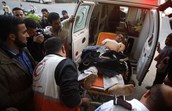
Israeli Occupation Forces (IOF) shot and injured a Palestinian man in northern Gaza Strip on Tuesday.
Israeli media sources revealed that the IOF soldiers shot and wounded a Palestinian young man who attempted to sneak into Kibbutz Zikim in the Negev just north of Gaza.
The forces arrested the young man after injuring him, the sources pointed out.
Young men in Gaza have recently increased attempts to infiltrate into 1948 occupied Palestine seeking jobs. Over one hundred of them have been rounded up by IOF soldiers since last November.
Israeli media sources revealed that the IOF soldiers shot and wounded a Palestinian young man who attempted to sneak into Kibbutz Zikim in the Negev just north of Gaza.
The forces arrested the young man after injuring him, the sources pointed out.
Young men in Gaza have recently increased attempts to infiltrate into 1948 occupied Palestine seeking jobs. Over one hundred of them have been rounded up by IOF soldiers since last November.
15 june 2015
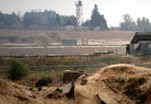
The Israeli Occupation Forces (IOF) opened their machine gun fire on Monday evening at Palestinian shepherds east of Zeitoun neighborhood to the east of Gaza City. No injuries were reported during the armed attack.
Local sources affirmed that Israeli fire deliberately targeted a number of Palestinian shepherds and a training site for Mujahideen Brigades.
Palestinian farmers are daily subjected to similar attacks while trying to have access to their agricultural lands along the eastern and northern border areas of Gaza Strip.
Local sources affirmed that Israeli fire deliberately targeted a number of Palestinian shepherds and a training site for Mujahideen Brigades.
Palestinian farmers are daily subjected to similar attacks while trying to have access to their agricultural lands along the eastern and northern border areas of Gaza Strip.
13 june 2015
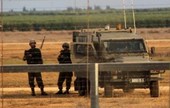
The Israeli occupation forces (IOF) on Saturday afternoon opened machinegun fire intensively at Palestinian farmers and their lands south of the Gaza Strip, with no reported casualties.
Local sources said that Israeli border soldiers spotted a young man as he was trying to cross the security fence east of Khuza'a district in Khan Younis and opened fire at him, pointing that the young man returned unharmed to Gaza.
The sources added that the soldiers kept firing indiscriminately at farmers and civilians in the area, where the Israeli army intensified its presence for fear there were other infiltrators.
Local sources said that Israeli border soldiers spotted a young man as he was trying to cross the security fence east of Khuza'a district in Khan Younis and opened fire at him, pointing that the young man returned unharmed to Gaza.
The sources added that the soldiers kept firing indiscriminately at farmers and civilians in the area, where the Israeli army intensified its presence for fear there were other infiltrators.

Israeli soldiers deployed near the Sufa crossing, in the southern Gaza Strip, opened fire at and injured a Palestinian, Saturday, local sources told Ma'an News Agency.
An Israeli army spokesperson confirmed the report, telling Ma'an that a "Palestinian suspect approached the security fence" and Israeli forces opened fire at his lower extremities after firing warning shots into the air. One hit was confirmed, and Israeli forces took the man to a hospital in Israel for treatment, she added. The spokesperson did not have confirmation if the injured man would be detained after treatment or returned to the Gaza Strip.
Sufa was one of several crossings between Gaza and Israel to be sealed by Israeli authorities in 2007 and was permanently closed in 2009, however is sporadically opened for humanitarian needs, according to Israeli rights group Gisha: Legal Center for Freedom of Movement.
The border area where Israeli forces opened fire Saturday is part of an Israeli-enforced "buffer zone" along the Gaza-Israel border as well as on the western seaside border of the Strip.
The parameters of the buffer zone are regularly changed by Israeli authorities, and Israeli forces have repeatedly opened fire toward Palestinian civilians inside of the buffer zone since the signing of a ceasefire agreement that ended a more than 50-day war between Israel and Hamas last summer, according to documentation by the Palestinian Center for Human Rights (PCHR).
Despite shorter distances set by Israeli authorities, PCHR reports that attacks against Palestinians have taken place up to approximately 1.5 kilometers inside the border fence. Constituting around 17 percent of the total territory of the Gaza Strip, the buffer zone effectively turns local farms into no-go zones. The buffer zone, which Palestinians are prohibited from entering, "is illegal under both Israeli and international law," according to PCHR.
An Israeli army spokesperson confirmed the report, telling Ma'an that a "Palestinian suspect approached the security fence" and Israeli forces opened fire at his lower extremities after firing warning shots into the air. One hit was confirmed, and Israeli forces took the man to a hospital in Israel for treatment, she added. The spokesperson did not have confirmation if the injured man would be detained after treatment or returned to the Gaza Strip.
Sufa was one of several crossings between Gaza and Israel to be sealed by Israeli authorities in 2007 and was permanently closed in 2009, however is sporadically opened for humanitarian needs, according to Israeli rights group Gisha: Legal Center for Freedom of Movement.
The border area where Israeli forces opened fire Saturday is part of an Israeli-enforced "buffer zone" along the Gaza-Israel border as well as on the western seaside border of the Strip.
The parameters of the buffer zone are regularly changed by Israeli authorities, and Israeli forces have repeatedly opened fire toward Palestinian civilians inside of the buffer zone since the signing of a ceasefire agreement that ended a more than 50-day war between Israel and Hamas last summer, according to documentation by the Palestinian Center for Human Rights (PCHR).
Despite shorter distances set by Israeli authorities, PCHR reports that attacks against Palestinians have taken place up to approximately 1.5 kilometers inside the border fence. Constituting around 17 percent of the total territory of the Gaza Strip, the buffer zone effectively turns local farms into no-go zones. The buffer zone, which Palestinians are prohibited from entering, "is illegal under both Israeli and international law," according to PCHR.
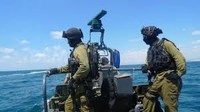
Head of the Palestinian fishermen syndicate Nizar Ayyash warned against the Israeli Navy systematic and deliberate attacks and daily arrests carried out in Gazan fishing waters.
Speaking to the PIC, Ayyash said that Israeli arrest and confiscation policy against fishermen and their fishing boats have been unprecedented increased over the past two weeks.
Under the Oslo Accords, a peace agreement between the Palestinian Liberation Organization and Israel signed in 1993, fishermen in Gaza were legally allowed to venture out 20 nautical miles. However, since the start of the second `intifada’ in 2000, the Israeli navy imposed a three-mile fishing limit.
Following the Israeli summer aggression on Gaza, the ceasefire agreement stated to increase Gaza's fishing space to five miles.
The ever-tightening restrictions, frequent attacks by Israeli gunboats, and the blockade mainly aim at destroying the infrastructure of the fishing sector, Ayyash charged.
The fishing industry suffered US$10 million worth of damage during the Israeli offensive on Gaza.
Speaking to the PIC, Ayyash said that Israeli arrest and confiscation policy against fishermen and their fishing boats have been unprecedented increased over the past two weeks.
Under the Oslo Accords, a peace agreement between the Palestinian Liberation Organization and Israel signed in 1993, fishermen in Gaza were legally allowed to venture out 20 nautical miles. However, since the start of the second `intifada’ in 2000, the Israeli navy imposed a three-mile fishing limit.
Following the Israeli summer aggression on Gaza, the ceasefire agreement stated to increase Gaza's fishing space to five miles.
The ever-tightening restrictions, frequent attacks by Israeli gunboats, and the blockade mainly aim at destroying the infrastructure of the fishing sector, Ayyash charged.
The fishing industry suffered US$10 million worth of damage during the Israeli offensive on Gaza.
12 june 2015
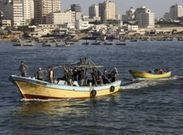
Israeli Navy ships opened fire, on Friday morning, on a number of Palestinian fishing boats, approximately 4 nautical miles away from the Gaza shore.
The Palestinian News & Info Agency (WAFA) said the navy ships opened fire on the navy boats, in the Gaza Sea, forcing the fishers back to shore, to avoid further fire.
The attack is part of daily violations against the fishers in the besieged and impoverished coastal region.
Similar attacks are frequently carried out against farmers in their lands, close to the border fence.
The Palestinian News & Info Agency (WAFA) said the navy ships opened fire on the navy boats, in the Gaza Sea, forcing the fishers back to shore, to avoid further fire.
The attack is part of daily violations against the fishers in the besieged and impoverished coastal region.
Similar attacks are frequently carried out against farmers in their lands, close to the border fence.
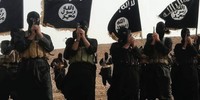
Salafist group Sheikh Omar Hadid fired a rocket last night from the Gaza Strip which landed in Ashkelon, southern Israel, saying that this action showed their commitment to armed resistance.
The group confirmed in a statement distributed in Gaza that the operation was in retaliation for the assassination of Izz al-Din by Israeli Occupation Forces (IOF) in “cold blood”.
The group also confirmed that it will continue its operations in reprisal for Hamas’ crackdown on Salafist groups, saying that the arrests and disarmament carried out by Hamas would not deter its supporters from continuing their fight against Israel.
Sources in the Gaza Strip reported that the Salafist groups saw that the Hamas announcement of Egypt’s cooperation sought to eliminate the groups, noting that the groups would nonetheless continue in their objectives.
Ma’ariv newspaper cited an Israeli security source as saying that Israel welcomes the Egyptian rapprochement with Hamas, noting that the military leaders in Israel see in this convergence a useful tool for the elimination of the Salafist groups, which have garnered a lot of underground support in Gaza due to Egypt’s recent military campaigns in the Sinai.
The newspaper also quoted the Israeli Head of Planning Division General Nimrod Shafer as saying that any rapprochement and alliance between Hamas and Egypt will lead to the weakening of the Salafist groups operating in the Gaza Strip.
Shafer said that Israel does not oppose the Egyptian rapprochement with Hamas, which is showing great willingness to cooperate in order to cope with the Salafist groups in conjunction with the Egyptian army. He noted that Hamas had sent many messages which confirmed that it was making every effort to prevent the firing of rockets at Israel, and that it did not want military escalation.
The group confirmed in a statement distributed in Gaza that the operation was in retaliation for the assassination of Izz al-Din by Israeli Occupation Forces (IOF) in “cold blood”.
The group also confirmed that it will continue its operations in reprisal for Hamas’ crackdown on Salafist groups, saying that the arrests and disarmament carried out by Hamas would not deter its supporters from continuing their fight against Israel.
Sources in the Gaza Strip reported that the Salafist groups saw that the Hamas announcement of Egypt’s cooperation sought to eliminate the groups, noting that the groups would nonetheless continue in their objectives.
Ma’ariv newspaper cited an Israeli security source as saying that Israel welcomes the Egyptian rapprochement with Hamas, noting that the military leaders in Israel see in this convergence a useful tool for the elimination of the Salafist groups, which have garnered a lot of underground support in Gaza due to Egypt’s recent military campaigns in the Sinai.
The newspaper also quoted the Israeli Head of Planning Division General Nimrod Shafer as saying that any rapprochement and alliance between Hamas and Egypt will lead to the weakening of the Salafist groups operating in the Gaza Strip.
Shafer said that Israel does not oppose the Egyptian rapprochement with Hamas, which is showing great willingness to cooperate in order to cope with the Salafist groups in conjunction with the Egyptian army. He noted that Hamas had sent many messages which confirmed that it was making every effort to prevent the firing of rockets at Israel, and that it did not want military escalation.
11 june 2015

Siren sounds in south after at least one rocket fired from Gaza; residents report sound of explosion; no damage or injuries reported.
A Red Alert siren signaling an incoming rocket sounded in the Ashkelon area on Thursday at around 10 PM.
Locals reported hearing a loud noise north of Ashkelon. No damage or injuries were reported.
The most recent incident of rocket fire in the Ashkelon area was on Saturday, which led Defense Minister Moshe Ya'alon to order the closure of Israel's two border crossings to the Gaza Strip - Kerem Shalom and Erez - until further notice.
Last Wednesday, at least two rockets were fired from the Gaza Strip at southern Israel around 11 PM local time, with at least one of them falling in an open area in the Sdot Negev Regional Council.
In response, Israel Air Force jets struck three targets in the Gaza Strip in the early hours of Thursday.
A Red Alert siren signaling an incoming rocket sounded in the Ashkelon area on Thursday at around 10 PM.
Locals reported hearing a loud noise north of Ashkelon. No damage or injuries were reported.
The most recent incident of rocket fire in the Ashkelon area was on Saturday, which led Defense Minister Moshe Ya'alon to order the closure of Israel's two border crossings to the Gaza Strip - Kerem Shalom and Erez - until further notice.
Last Wednesday, at least two rockets were fired from the Gaza Strip at southern Israel around 11 PM local time, with at least one of them falling in an open area in the Sdot Negev Regional Council.
In response, Israel Air Force jets struck three targets in the Gaza Strip in the early hours of Thursday.

The EU Special Representative for the Middle East peace process, Fernando Gentilini, arrived in the blockaded Gaza Strip on Thursday morning in a first visit of its kind by the official.
A Palestinian official in Gaza’s department of border-crossings said Gentilini arrived in the Strip via the Beit Hanoun (Erez) border crossing, accompanied by a senior European delegation.
The European peace envoy is set to meet, during his short stopover in the coastal strip, with a number of representatives of international institutions and human rights organizations, along with several high-ranking Palestinian officials.
European officials have increasingly been dropping by the Gaza Strip in short follow-up stopovers aimed at assessing the current state of affairs in the besieged enclave, where living conditions have gone remarkably worse since the wake of last summer’s Israeli 51-day military offensive.
A Palestinian official in Gaza’s department of border-crossings said Gentilini arrived in the Strip via the Beit Hanoun (Erez) border crossing, accompanied by a senior European delegation.
The European peace envoy is set to meet, during his short stopover in the coastal strip, with a number of representatives of international institutions and human rights organizations, along with several high-ranking Palestinian officials.
European officials have increasingly been dropping by the Gaza Strip in short follow-up stopovers aimed at assessing the current state of affairs in the besieged enclave, where living conditions have gone remarkably worse since the wake of last summer’s Israeli 51-day military offensive.
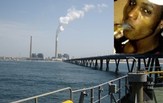
Israeli media sources reported Wednesday that an Israeli soldier of Ethiopian descent was captured by Hamas movement last September.
The Israeli-Ethiopian soldier Abraham Mengistu, 24, has been captured by Hamas movement for nearly ten months, the sources said.
Abraham, from Ashkelon, was dragged into the northern shores of Gaza following Israel's summer war on Gaza in 2014, according to the sources.
Israeli authorities have earlier demanded from the missing soldier's family not speak to the media. The gag order, according to analysts, comes to prove how Israeli does not care about Jews of colour.
The Israeli-Ethiopian soldier Abraham Mengistu, 24, has been captured by Hamas movement for nearly ten months, the sources said.
Abraham, from Ashkelon, was dragged into the northern shores of Gaza following Israel's summer war on Gaza in 2014, according to the sources.
Israeli authorities have earlier demanded from the missing soldier's family not speak to the media. The gag order, according to analysts, comes to prove how Israeli does not care about Jews of colour.
10 june 2015
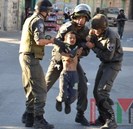
By Khalid Amayreh in Occupied Palestine
Throughout its unglamorous history, the UN issued many scandalous reports and adopted many scandalous resolutions reflecting lack of justice and absence of moral honesty.
This ever-existing symptom also reflected western hegemony over the international organization.
However, none of these reports and resolutions seems more scandalous than this week's report which kept Israel off the List of Shame, which includes states and entities that abuse children.
This particular report is manifestly scandalous precisely because Israel is probably one of the most obscene abusers of children under the sun.
Indeed, there are a few countries in this world that can be compared to Israel in this respect.
At the top of the list of shame sits the Nazi-like Syrian regime of Bashar el-Assad which habitually and routinely murders children (and other civilians) in large numbers, either by dropping crude barrel bombs on residential neighborhoods and crowded streets or using deadly chemical agents against heavily populated areas.
To be sure, Israel uses neither crude barrel bombs nor chemical weapons to annihilate Palestinian children. Instead, the Jewish state achieves the same results by using huge laser guided bombs and missiles to destroy residential multi-story buildings, packed with civilians, including children.
Needless to say, the ultimate result of such barbarity is a little Auschwitz.
Exterminating from high altitudes is, of course, Israel's preferred way of murdering Palestinian children and casting shock and awe in their hearts.
But it is by no means the only way. In its last year's blitzkrieg in Gaza, Israel obliterated entire neighborhoods, such as Shujaiyya, utterly annihilating everything, including human, building and plant.
According to eyewitnesses, the scene at the bombed-out neighborhood very much looked as if borrowed from the German city of Dresden in 1945.
Killing knowingly is killing deliberately
In its last year's aggression on the Gaza Strip, Israel murdered at least 500 Palestinian children, in addition to hundreds of other civilians, including many entire families.
In earlier rounds of aggression, Israel had murdered and maimed hundreds of children.
Israel has a long history of premeditatedly murdering Palestinian children. In light, one would exaggerate little by saying that Israel boasts the highest per capita rate of child-killers in the world.
Israel readily acknowledges that it kills Palestinian children knowingly.
A few years ago, this writer spoke with an Israeli Foreign Ministry spokeswoman who said that "Yes, we do know that Palestinian children are being killed as a result of our military activities, but we don't do it deliberately."
But this is a sheer lie, because in the final analysis killing knowingly is killing deliberately.
Indeed, mistakes in wars do occur and innocent civilians get killed. However, mistakes happen a few times not hundreds of times because in this case killing civilians becomes de facto policy.
This has always been and continues to be Israel's policy. They kill the innocent civilians first and then, only then, the Israeli foreign ministry and other mouthpieces of Israeli hasbara (propaganda) get busy justifying the Nazi-like atrocities, mainly by concocting every conceivable lie and inventing fabulous narratives that have absolutely no iota of truth.
This reminds me of routine communiqués issued by the Israeli security forces during the first Palestinian intifada which started in December of 1987. Then the Israeli army spokesman would issue statements like this following the murder of Palestinian boys in the streets of the West Bank.
"IDF soldiers fired into the air to disperse Palestinian rioters. Palestinian sources reported five youths killed." The wording of the Israeli army statements made many foreign observers, utterly affronted by the brutal ugliness of Israeli dishonesty, wonders if Palestinian boys had wings and could fly.
Moral bankruptcy
The clarion failure of the UN to condemn brazen Israeli criminality and brash violation of international law underscores the moral bankruptcy of the world body.
Consequently, more states and peoples will lose confidence in the ability and willingness of the UN to foster peace and justice throughout the world. Unfortunately, this is becoming more evident as time passes.
Eventually, this could transform our world into a real jungle, an unmistakable portent signaling ultimate self-destruction.
Khalid Amayreh is a Palestinian journalist and current affairs commentator living in Israeli Occupied Palestine.
Throughout its unglamorous history, the UN issued many scandalous reports and adopted many scandalous resolutions reflecting lack of justice and absence of moral honesty.
This ever-existing symptom also reflected western hegemony over the international organization.
However, none of these reports and resolutions seems more scandalous than this week's report which kept Israel off the List of Shame, which includes states and entities that abuse children.
This particular report is manifestly scandalous precisely because Israel is probably one of the most obscene abusers of children under the sun.
Indeed, there are a few countries in this world that can be compared to Israel in this respect.
At the top of the list of shame sits the Nazi-like Syrian regime of Bashar el-Assad which habitually and routinely murders children (and other civilians) in large numbers, either by dropping crude barrel bombs on residential neighborhoods and crowded streets or using deadly chemical agents against heavily populated areas.
To be sure, Israel uses neither crude barrel bombs nor chemical weapons to annihilate Palestinian children. Instead, the Jewish state achieves the same results by using huge laser guided bombs and missiles to destroy residential multi-story buildings, packed with civilians, including children.
Needless to say, the ultimate result of such barbarity is a little Auschwitz.
Exterminating from high altitudes is, of course, Israel's preferred way of murdering Palestinian children and casting shock and awe in their hearts.
But it is by no means the only way. In its last year's blitzkrieg in Gaza, Israel obliterated entire neighborhoods, such as Shujaiyya, utterly annihilating everything, including human, building and plant.
According to eyewitnesses, the scene at the bombed-out neighborhood very much looked as if borrowed from the German city of Dresden in 1945.
Killing knowingly is killing deliberately
In its last year's aggression on the Gaza Strip, Israel murdered at least 500 Palestinian children, in addition to hundreds of other civilians, including many entire families.
In earlier rounds of aggression, Israel had murdered and maimed hundreds of children.
Israel has a long history of premeditatedly murdering Palestinian children. In light, one would exaggerate little by saying that Israel boasts the highest per capita rate of child-killers in the world.
Israel readily acknowledges that it kills Palestinian children knowingly.
A few years ago, this writer spoke with an Israeli Foreign Ministry spokeswoman who said that "Yes, we do know that Palestinian children are being killed as a result of our military activities, but we don't do it deliberately."
But this is a sheer lie, because in the final analysis killing knowingly is killing deliberately.
Indeed, mistakes in wars do occur and innocent civilians get killed. However, mistakes happen a few times not hundreds of times because in this case killing civilians becomes de facto policy.
This has always been and continues to be Israel's policy. They kill the innocent civilians first and then, only then, the Israeli foreign ministry and other mouthpieces of Israeli hasbara (propaganda) get busy justifying the Nazi-like atrocities, mainly by concocting every conceivable lie and inventing fabulous narratives that have absolutely no iota of truth.
This reminds me of routine communiqués issued by the Israeli security forces during the first Palestinian intifada which started in December of 1987. Then the Israeli army spokesman would issue statements like this following the murder of Palestinian boys in the streets of the West Bank.
"IDF soldiers fired into the air to disperse Palestinian rioters. Palestinian sources reported five youths killed." The wording of the Israeli army statements made many foreign observers, utterly affronted by the brutal ugliness of Israeli dishonesty, wonders if Palestinian boys had wings and could fly.
Moral bankruptcy
The clarion failure of the UN to condemn brazen Israeli criminality and brash violation of international law underscores the moral bankruptcy of the world body.
Consequently, more states and peoples will lose confidence in the ability and willingness of the UN to foster peace and justice throughout the world. Unfortunately, this is becoming more evident as time passes.
Eventually, this could transform our world into a real jungle, an unmistakable portent signaling ultimate self-destruction.
Khalid Amayreh is a Palestinian journalist and current affairs commentator living in Israeli Occupied Palestine.

A Palestinian man standing in what remained of his house during last summer's war in Gaza
Half of Gazans say they are considering emigration from the Gaza Strip, according to the Palestinian Center for Policy and Survey Research.
AFP reports that the 50 percent of those polled in Gaza thinking of leaving the coastal enclave is the highest percentage ever recorded, amidst decreasing satisfaction of achievements attained by Hamas last summer's war.
Increasing frustration comes the IMF reported last month that reconstruction since the most recent war between Israel and Hamas has been significantly lower than expected, while the World Bank reported that the strip was facing a "dangerous fiscal crisis".
Unemployment in Gaza increased in 2014 "to reach 44 percent -- probably the highest in the world," the World Bank reported, with the poverty rate in the occupied Palestinian territory reaching 39 percent, despite the fact that nearly four of every five Gazans receive "some aid".
"Gaza's unemployment and poverty figures are very troubling and the economic outlook is worrying," the World Bank quoted Palestinian territories director Steen Lau Jorgensen as saying in a statement.
The UN has repeatedly warned of further conflict in the area if the reconstruction process continues at such slow pace, emphasizing that Gaza's humanitarian crisis is worsened by Israel's eight-year blockade on the Strip.
Despite the new record high levels of desire for emigration from the war-ravaged strip, Gaza residents would still favor reelection of Gaza's governing party Hamas' Ismail Haniyeh to Fateh's leader Mahmoud Abbas, PSR polls also said in the June report.
In the West Bank, however, the level of satisfaction with the performance of Abbas rose to 44 percent, compared to 40 percent three months prior.
If new legislative elections were held today with the participation of all factions, 72 percent of Palestinians in the West Bank and Gaza Strip say they would participate. Of those who would participate, 35 percent say they would vote for Hamas and 39 percent say they would vote for Fatah, 11 percent would vote for all other third parties combined, and 16 percent are undecided.
Elections have not been held since 2006 largely due to ongoing political divisions between Fateh and Hamas.
Half of Gazans say they are considering emigration from the Gaza Strip, according to the Palestinian Center for Policy and Survey Research.
AFP reports that the 50 percent of those polled in Gaza thinking of leaving the coastal enclave is the highest percentage ever recorded, amidst decreasing satisfaction of achievements attained by Hamas last summer's war.
Increasing frustration comes the IMF reported last month that reconstruction since the most recent war between Israel and Hamas has been significantly lower than expected, while the World Bank reported that the strip was facing a "dangerous fiscal crisis".
Unemployment in Gaza increased in 2014 "to reach 44 percent -- probably the highest in the world," the World Bank reported, with the poverty rate in the occupied Palestinian territory reaching 39 percent, despite the fact that nearly four of every five Gazans receive "some aid".
"Gaza's unemployment and poverty figures are very troubling and the economic outlook is worrying," the World Bank quoted Palestinian territories director Steen Lau Jorgensen as saying in a statement.
The UN has repeatedly warned of further conflict in the area if the reconstruction process continues at such slow pace, emphasizing that Gaza's humanitarian crisis is worsened by Israel's eight-year blockade on the Strip.
Despite the new record high levels of desire for emigration from the war-ravaged strip, Gaza residents would still favor reelection of Gaza's governing party Hamas' Ismail Haniyeh to Fateh's leader Mahmoud Abbas, PSR polls also said in the June report.
In the West Bank, however, the level of satisfaction with the performance of Abbas rose to 44 percent, compared to 40 percent three months prior.
If new legislative elections were held today with the participation of all factions, 72 percent of Palestinians in the West Bank and Gaza Strip say they would participate. Of those who would participate, 35 percent say they would vote for Hamas and 39 percent say they would vote for Fatah, 11 percent would vote for all other third parties combined, and 16 percent are undecided.
Elections have not been held since 2006 largely due to ongoing political divisions between Fateh and Hamas.

Israeli Occupation Forces carried out a limited incursion Wednesday morning into the eastern areas of Khan Younis to the south of Gaza strip.
Israeli military vehicles were observed by local residents penetrating 150 meters into Qarara border town east of Khan Younis.
Wednesday's incident came as part of Israeli near-daily violations to the ceasefire agreement reached on August 26, 2014 between Palestinian resistance and Israel to end its 51-day aggression on Gaza.
Over May, human rights report documented 21 Israeli similar violations including 14 shooting and incursion cases and 6 arrests.
Israeli military vehicles were observed by local residents penetrating 150 meters into Qarara border town east of Khan Younis.
Wednesday's incident came as part of Israeli near-daily violations to the ceasefire agreement reached on August 26, 2014 between Palestinian resistance and Israel to end its 51-day aggression on Gaza.
Over May, human rights report documented 21 Israeli similar violations including 14 shooting and incursion cases and 6 arrests.
Truce violations List of names Pictures of martyrs
Days: Aug: 26 - 25 - 24 - 23 - 22 - 21 - 20 - 19 - 18 - 17 - 16 - 15 - 14 - 13 - 12 - 11 - 10 - 9 - 8 - 7 - 6 - 5 - 4 - 3 - 2 - 1
July: 31 - 30 - 29 - 28 - 27 - 26 - 25 - 24 - 23 - 22 - 21 - 20 - 19 - 18 - 17 - 16 - 15 - 14 - 13 - 12 - 11 - 10 - 9 - 8
